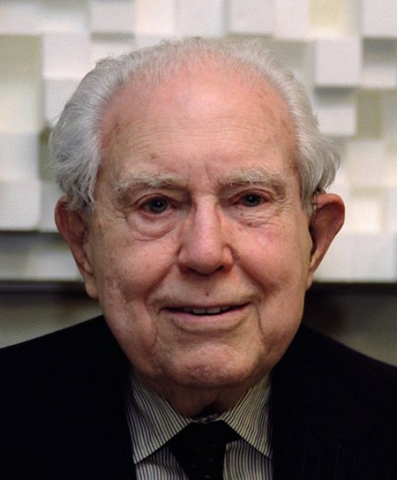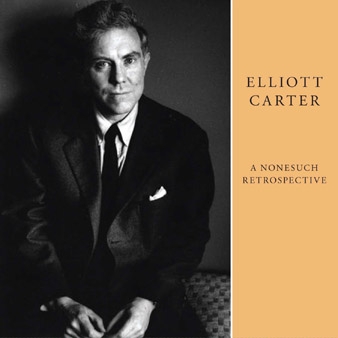Celebrating Elliott Carter’s 100th birthday, this "covetable and historic" four-disc set (The Observer) includes most of the recordings Nonesuch made of Carter’s music between 1968 and 1985, with performances by such acclaimed musicians as Paul Jacobs, Gilbert Kalish, the Composers Quartet, Jan DeGaetani, Fred Sherry, Arthur Weisberg, the Contemporary Chamber Ensemble, and the Chicago Symphony Orchestra led by James Levine; plus a 58-page booklet, with photos, score examples, texts, and tributes by musicians and composers.
To celebrate Elliott Carter’s 100th birthday, Nonesuch released Elliott Carter: A Nonesuch Retrospective, a four-disc set, on February 24, 2009. The discs include most of the recordings Nonesuch made of Carter’s music between 1968 and 1985; The Observer calls the collection "covetable and historic."
These recordings include performances by many acclaimed musicians, including Paul Jacobs, Gilbert Kalish, the Composers Quartet, Jan DeGaetani, Fred Sherry, Arthur Weisberg, the Contemporary Chamber Ensemble, and the Chicago Symphony Orchestra conducted by James Levine. The original Nonesuch records were produced by Joanna Nickrenz and Marc Aubort, and later, Teresa Sterne, Max Wilcox, and Oliver Knussen. A 58-page booklet—with photos, score examples, texts, an essay by Paul Griffiths, and tributes by musicians and composers including Virgil Blackwell, Tod Machover, Ursula Oppens, and Fred Sherry—accompanies the discs.
A two-time Pulitzer Prize winner and the first composer to receive the United States National Medal of Arts, Elliott Carter is internationally recognized as one of the leading American voices of the 20th-century classical music tradition. First encouraged toward a musical career by his friend and mentor Charles Ives, Carter attended Harvard University, where he studied with Walter Piston, and later went to Paris, where for three years he studied with Nadia Boulanger. He then returned to New York to devote his time to composing and teaching. Carter was recognized by the Pulitzer Prize Committee for the first time in 1960 for his groundbreaking String Quartet No. 2. Stravinsky hailed Carter’s Double Concerto for Harpsichord & Piano with Two Chamber Orchestras (1961) and Piano Concerto (1967), as “masterpieces,” while Aaron Copland called him “one of America's most distinguished creative artists in any field.”
As Paul Griffiths writes in the box-set booklet:
Born when Enrico Caruso was cutting cylinders, Elliott Carter has lived through most of the history of recording, and contributed to that history through his associations with various companies. First among these was Nonesuch, beginning in 1969 and continuing for over twenty years. Two albums of the 1970s, featuring his first two string quartets and Double Concerto, played a conspicuous role in carrying his music to a wide audience, and so in bringing him the acclaim that encouraged him to go on, with undiminished vigor, into a ‘late period’ that has lasted more than thirty years. Nonesuch was not only the first label to give Carter’s music international distribution and continuing support, it also placed his work in an appropriate context of discovery and adventure.
Elliott Carter turned 100 years old on December 11, 2008. His centenary is being celebrated internationally with performances in New York, Madrid, Turin, Amsterdam, Paris, Berlin, Tokyo, Vienna, and London. A complete list of works and performances, as well as downloadable photos, images, biographies, and a video interview, can be found at carter100.com.
PRODUCTION CREDITS
Disc One
Tracks 1-2 Produced and engineered by Max Wilcox; Recorded August 1982 at RCA Studio A, New York City
Tracks 3-4 Produced by Teresa Sterne; Engineering and Musical Production: Max Wilcox; Recorded December 1987 at the American Academy and Institute of Arts and Letters, New York City; Digital Engineering: MacDonald Moore
Tracks 5-21 Produced and engineered by Max Wilcox; Recorded December 6, 1988 at the Manhattan Center, New York City
Track 22 Production and Musical Supervision by Marc J. Aubort and Joanna Nickrenz; Recorded April 2, 1980 at Ambassador Auditorium, Pasadena, California; Engineered by Elite Recordings, Inc. and Roger Mayer, Elektra Sound Recorders
Disc Two
Tracks 1-4 Coordinator: Teresa Sterne; Recorded August 1968 at Rutgers Presbyterian Church, New York City; Engineered by Marc J. Aubort
Track 5-7 Coordinator: Teresa Sterne; Recorded April 21-23, 1970 under the musical supervision of the composer; Engineered by Marc J. Aubort and Joanna Nickrenz; Mastered by Robert C. Ludwig
Track 8-10 Coordinator: Teresa Sterne; Recorded August 1968 at Rutgers Presbyterian Church, New York City, under the musical supervision of the composer; Engineered by Marc J. Aubort
Disc Three
Track 1 Executive Producer: Dr. Steven Paul; Recording Producer: Christopher Adler; Recorded July 1990 at Orchestra Hall, Chicago; Balance Engineer: Gregor Zielinsky; Recording Engineers: Klaus Behrens, Hans-Rudolf Muller; Post-Production and editing: Arend Prohmann
Track 2-10 Coordinator: Teresa Sterne; Recorded April 21-23, 1970 under the musical supervision of the composer; Engineered by Marc J. Aubort and Joanna Nickrenz; Mastered by Robert C. Ludwig
Tracks 11-17 Coordinator: Teresa Sterne; Commissioned by the Fromm Music Foundation; Recorded September 1973 by Phonag Studios, Lindau/Zurich, Switzerland, in cooperation with Elite Recordings, Inc., New York; Recording Directors: Helmuth Kolbe and Joanna Nickrenz; Engineered by Helmuth Kolbe and Robert Lattman
Disc Four
Track 1 Produced and engineered by Max Wilcox; Recorded August 1982 at RCA Studio A, New York City
Tracks 2-7 Produced by Oliver Knussen; Recorded November 5, 1984 at St. Luke's Church, Hampstead, London; Engineered by Sally Groves and John Whiting; Digital editing: Bob Auger
Tracks 8-13 Produced by Oliver Knussen; Recorded February 29, 1984 at Rosslyn Hill Chapel, Hampstead, London; Engineered by Sally Groves and John Whiting; Digital editing: Bob Auger
Mastered by Robert C. Ludwig at Gateway Mastering, Portland, Maine
Texts for In Sleep, In Thunder from Collected Poems by Robert Lowell. Copyright © 2003 by Harriet Lowell and Sheridan Lowell.
Design by Nathan Garland
Box cover photograph by Bill & Gwen Sloan
510893
MUSICIANS
Disc One
Paul Jacobs, piano (1-2)
Jan DeGaetani, mezzo-soprano; Gilbert Kalish, piano (3-4)
New York Chamber Symphony, Gerard Schwarz, conductor (5-21)
Los Angeles Chamber Orchestra, Gerard Schwarz, conductor (22)
Disc Two
Joel Krosnick, cello; Paul Jacobs, piano (1-4)
The Composers Quartet (5-7): Matthew Raimondi, Anahid Ajemian, violin; Jean Dupouy, viola; Michael Rudiakov, cello
Harvey Sollberger, flute; Charles Kuskin, oboe; Fred Sherry, cello; Paul Jacobs, harpsichord (8-10)
Disc Three
Chicago Symphony Orchestra, James Levine, conductor (1)
The Composers Quartet (2-10): Matthew Raimondi, Anahid Ajemian, violin; Jean Dupouy, viola; Michael Rudiakov, cello
Paul Jacobs, harpsichord; Gilbert Kalish, piano; The Contemporary Chamber Ensemble (11-17): Arthur Weisberg, conductor. Orchestra I (harpsichord): Paul Dunkel, flute/piccolo; Douglas Hill, horn; Allan Dean, trumpet; John Swallow, trombone; Raymond DesRoches, Claire Heldrich, percussion; Jacob Glick, viola; Jeffrey Levine, contrabass. Orchestra II (piano): George Haas, oboe; Allen Blustine, clarinet/piccolo clarinet; Donald MacCourt, bassoon; Joseph Anderer, horn; Howard Van Hyning, Richard Fitz, percussion; Linda Quan, violin; Fred Sherry, cello
Disc Four
Paul Jacobs, piano (1)
The Fires of London (2-7): Philippa Davies, flute; David Campbell, clarinet; Rosemary Furniss, violin; Jonathan Williams, cello; Gregory Knowles, percussion
Martyn Hill, tenor; London Sinfonietta, Oliver Knussen, conductor (8-13)








